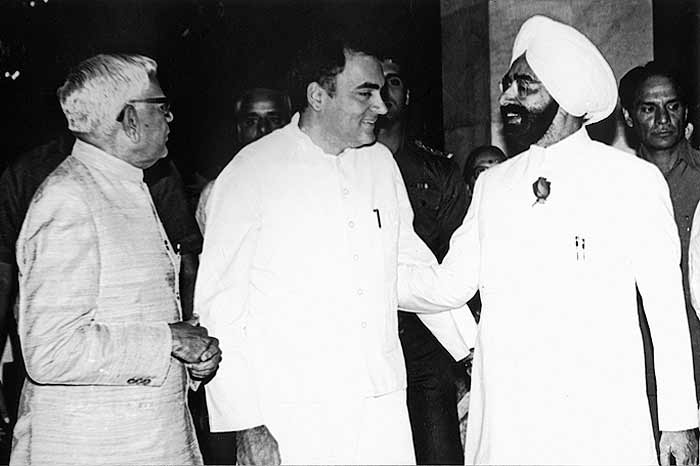Archived_Member16
SPNer
the next president
The Giani’s Riot Act
Zail Singh would have gladly been Indira’s ‘sweeper’. The rules changed for Rajiv.
Uttam Sengupta - Outlookindia Magazine - April 30, 2012

Zail Singh with Rajiv and R. Venkataraman
President Giani Zail Singh was in Yemen when Indira Gandhi was assassinated by two of her security guards in October 1984. On the aircraft back, Zail Singh told accompanying newsmen that he would “appoint” Rajiv Gandhi as the next prime minister. The ruling party had the right to elect a leader but he, as president, had the authority to appoint the PM, he declared.
The Giani, who had no formal secular education, would later say, with evident satisfaction, that he had repaid a debt. Loyal to the Gandhi family, he had at one point caused a furore by asserting that he’d have even accepted the post of a sweeper from Indira.
The two, however, fell out soon enough, the anti-Sikh riots and the president’s inability to do anything to stop the rioting, turning the relationship cold. “The president could not get through to the home minister. The Delhi L-G told him that everyone was busy preparing for the funeral and though the president is the supreme commander of the armed forces, Gianiji could not call the army out to quell the rioting,” recalls Tarlochan Singh, his media advisor between 1982-87.
Rumours that the president had deliberately administered the oath of office to Rajiv even before a Congress parliamentary party meeting could be held (purportedly so that he himself could run the show) sowed the seeds for more discord. The government’s decision to withdraw Zail Singh’s favourite bureaucrat I.S. Bindra (on deputation to the Rashtrapati Bhavan) without consulting him widened the gulf.
Rajiv then dissolved the Lok Sabha without consulting the president and even did away with niceties like calling on him before going abroad or briefing him on return. Zail Singh was also denied a role in his home state, Punjab, and the Rajiv-Longowal Accord was scripted without any reference to him.
The president, though, put his foot down when the government wanted him to praise, in his address to Parliament, the new Punjab CM, S.S. Barnala. Rashtrapati Bhavan returned the draft but it was sent back to him again. Finally, a few weeks after the laudatory references were made, Barnala was unceremoniously eased out.
Another incident that queered the pitch was then MoS for external affairs K.K. Tewary’s allegation in Parliament that the president had harboured terrorists at the Rashtrapati Bhavan. Although Rajiv defended the president in Parliament, it didn’t go down well with Gianiji who wrote a damning letter to the PM which also appeared in a newspaper the very next day. This, coupled with the president’s refusal to sign the Postal Bill, authorising the police to intercept and open mails, opened a can of worms. Congress dissidents flocked to the Rashtrapati Bhavan while the home ministry put the presidential residence under surveillance. So much so that Zail Singh would escort visitors to the lawn outside to chat, convinced the rooms in Rashtrapati Bhavan were bugged.
In a sweet twist to the tale, though, Zail Singh and Rajiv later made up. Gianiji, who had no house outside his village, was allotted a house in Delhi by the government after he left office, the first president to enjoy the privilege. “If only the two had worked together,” laments Tarlochan. Zail Singh had profound knowledge of the scriptures and invariably impressed the heads of state he interacted with, recalls his media advisor.
Indira Gandhi, claims Tarlochan, consulted the Congress parliamentary board and the CMs over their choice for president in 1982. “An overwhelming majority, and surprisingly, the CMs from southern states, favoured Gianiji,” prompting Indira to ask in jest whether Zail Singh was busy marshalling votes in the home ministry.
source: http://www.outlookindia.com/article.aspx?280622


